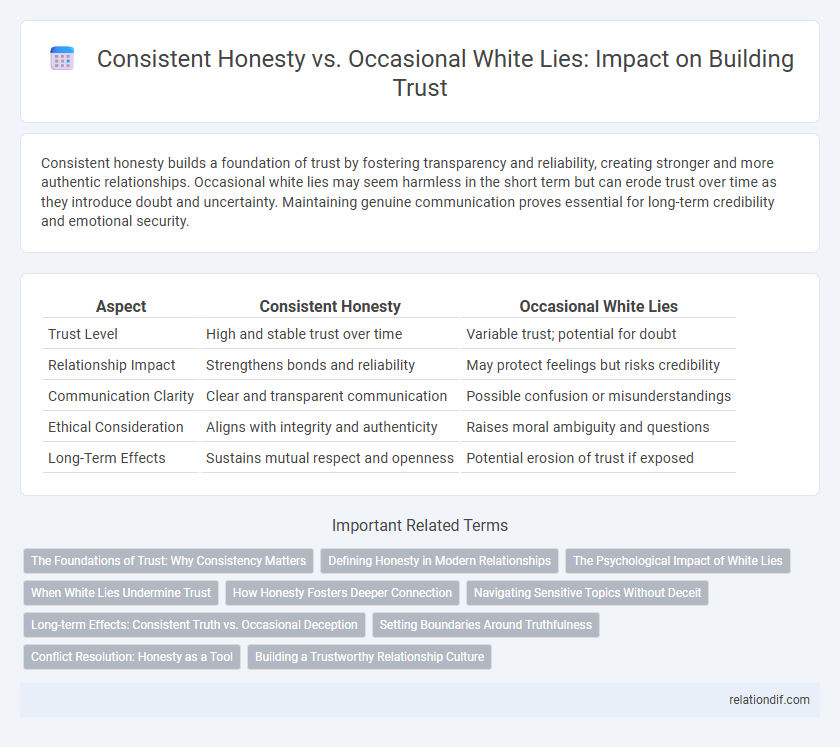Consistent honesty builds a foundation of trust by fostering transparency and reliability, creating stronger and more authentic relationships. Occasional white lies may seem harmless in the short term but can erode trust over time as they introduce doubt and uncertainty. Maintaining genuine communication proves essential for long-term credibility and emotional security.
Table of Comparison
| Aspect | Consistent Honesty | Occasional White Lies |
|---|---|---|
| Trust Level | High and stable trust over time | Variable trust; potential for doubt |
| Relationship Impact | Strengthens bonds and reliability | May protect feelings but risks credibility |
| Communication Clarity | Clear and transparent communication | Possible confusion or misunderstandings |
| Ethical Consideration | Aligns with integrity and authenticity | Raises moral ambiguity and questions |
| Long-Term Effects | Sustains mutual respect and openness | Potential erosion of trust if exposed |
The Foundations of Trust: Why Consistency Matters
Consistent honesty establishes a reliable foundation for trust by creating predictable and transparent interactions that reinforce integrity over time. Occasional white lies, even if well-intentioned, introduce uncertainty and erode confidence, weakening the essential bond that trust depends on. Trust thrives on consistency because it assures individuals that truthfulness remains unwavering, fostering deeper emotional security and credibility.
Defining Honesty in Modern Relationships
Consistent honesty in modern relationships fosters trust, clear communication, and emotional security, while occasional white lies risk undermining intimacy despite intentions to protect feelings. Defining honesty involves embracing transparency, where partners share truths with empathy and respect, strengthening the relational foundation. Research indicates that perceived honesty correlates directly with relationship satisfaction and long-term stability.
The Psychological Impact of White Lies
White lies may temporarily ease social tensions but can lead to increased anxiety and self-doubt as individuals struggle with conflicting moral values. Consistent honesty fosters psychological well-being by promoting trust, reducing cognitive dissonance, and reinforcing a positive self-concept. Over time, reliance on white lies undermines interpersonal relationships and diminishes emotional resilience.
When White Lies Undermine Trust
White lies, while often intended to protect feelings, can gradually erode the foundation of trust in relationships by creating uncertainty about the truth. Consistent honesty fosters reliability and transparency, enabling stronger emotional connections and effective communication. When white lies accumulate, they obscure reality, making it difficult for individuals to discern genuine intentions and undermining mutual confidence.
How Honesty Fosters Deeper Connection
Consistent honesty builds trust by creating a reliable foundation where individuals feel safe and valued, fostering deeper emotional connections. Transparent communication encourages vulnerability and mutual respect, which strengthens relationships over time. In contrast, occasional white lies can erode trust and hinder genuine intimacy by introducing doubt and uncertainty.
Navigating Sensitive Topics Without Deceit
Consistent honesty fosters deep trust by creating a clear, reliable communication path that avoids misconceptions and builds emotional safety. Navigating sensitive topics without deceit involves using empathy and tact to express difficult truths gently rather than resorting to white lies. This approach strengthens relationships by promoting genuine understanding and mutual respect, ensuring long-term trustworthiness.
Long-term Effects: Consistent Truth vs. Occasional Deception
Consistent honesty fosters trust and strengthens relationships over time by creating a reliable foundation of transparency and integrity. Occasional white lies, while sometimes intended to protect feelings, can erode trust and lead to skepticism when discovered. Long-term effects favor consistency in truthfulness, as it minimizes misunderstandings and promotes genuine connections.
Setting Boundaries Around Truthfulness
Setting boundaries around truthfulness requires distinguishing between consistent honesty and occasional white lies to maintain trust without causing unnecessary harm. Consistent honesty fosters transparency and reliability, building a strong foundation for healthy relationships, while occasional white lies, if used sparingly and respectfully, can prevent unnecessary conflicts and protect feelings. Balancing these approaches involves clear communication about when full disclosure is essential and when tactful omissions or minor fabrications serve the greater good without eroding trust.
Conflict Resolution: Honesty as a Tool
Consistent honesty fosters transparent communication and builds a strong foundation of trust essential for effective conflict resolution. Occasional white lies may seem to ease tensions temporarily but often undermine long-term credibility and hinder genuine problem-solving. Utilizing honesty as a tool encourages accountability and mutual understanding, leading to more sustainable resolutions and strengthened relationships.
Building a Trustworthy Relationship Culture
Consistent honesty fosters a foundation of trust by creating predictable and transparent communication, which strengthens relationships over time. Occasional white lies, while seemingly harmless, can erode trust by introducing doubt and uncertainty in interactions. Prioritizing truthful dialogue cultivates a trustworthy relationship culture essential for long-term connection and mutual respect.
Consistent honesty vs Occasional white lies Infographic

 relationdif.com
relationdif.com